Dennis Okwera – the light of Lumule

Roula Khalaf, Editor of the FT, selects her favourite stories in this weekly newsletter.
The day the rebels took Lumule, Uganda, they sneaked into the village and rang the school bell. Attendance had been sporadic in the months before the takeover: a bell signalled class was safe to attend. Children gathered their books and headed over excitedly. A few spotted the gunmen; others were too late.
Lumule-born Dennis Okwera was among the group of children who got ready for school that day. He would have gone with them had his grandmother not stopped him; the bell didn’t ring as it normally would. “She sensed something wasn’t right,” says Okwera, now in his early 30s. He left Lumule to stay with his aunt and brother, Chris – first in Gulu, a city in the north, then moving south-east when the fighting intensified. Before this, much of his childhood had been spent living with his paternal grandmother. Okwera’s father had fled for the UK before Lumule’s takeover; his mother moved away after the divorce.

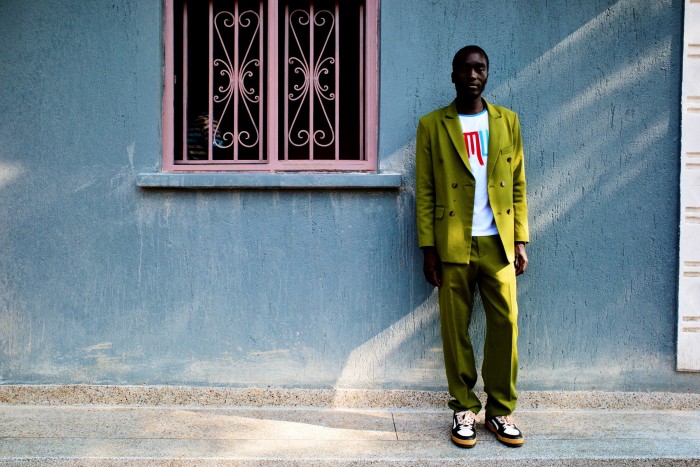
Today, Okwera is a successful model. He has worked on campaigns for brands such as Dunhill, Alex Eagle and Wales Bonner, and featured in numerous magazines, including HTSI. He’s also a biochemistry graduate, a trained plumber and builder, and has helped put three of his cousins in Uganda through school.
Okwera joined his father in the UK, along with his brother, in the early 2000s. Life wasn’t much easier: the family had no permanent residence, a requisite for the boys’ education. It wasn’t until Okwera started modelling – at first sceptically and later in earnest – that his finances stabilised. Today, Okwera lives modestly in south-east London, in a “box flat”. Most of his earnings have gone back to Uganda – buying a house for his mother, from whom he was estranged for 22 years, paying his cousins’ school fees and supporting the wider community with school books, pens, sanitary products and other incidentals. More recently, he has funnelled his earnings back into a newly registered charity – the Lumule Foundation – which he launched in 2022. The goal is to “empower the people of [his] community”, and ultimately the rest of northern Uganda. Until recently, the project was entirely self-funded by Okwera. He estimates he has spent around £40,000 of his own money so far.
Okwera’s early memories of Lumule are clouded by the Lord’s Resistance Army, an organisation responsible for abducting more than 67,000 youths – among them 30,000 children – during the 1987-2008 civil war in northern Uganda. It is estimated that around 1.6 million people were displaced by the conflict. “We slept outside in the bush,” says Okwera of how he and his brother avoided forced conscription. “You had to be ready to run.” Two of Okwera’s cousins were captured on the day of the school insurrection; neither has been heard from since.
Today, says Okwera, Lumule is “peaceful”. Most of the fighting ended in 2006 but in its place are ugly scars, destroyed buildings and a near-total lack of infrastructure. Other consequences are less tangible. “From 12 years of age you were a child soldier with a gun in your hand – you had to prove you were worthy to lead,” says Okwera of the country’s former soldiers. “Those boys are now back from the war and having children. How do we help those children with the trauma their parents are going through?”

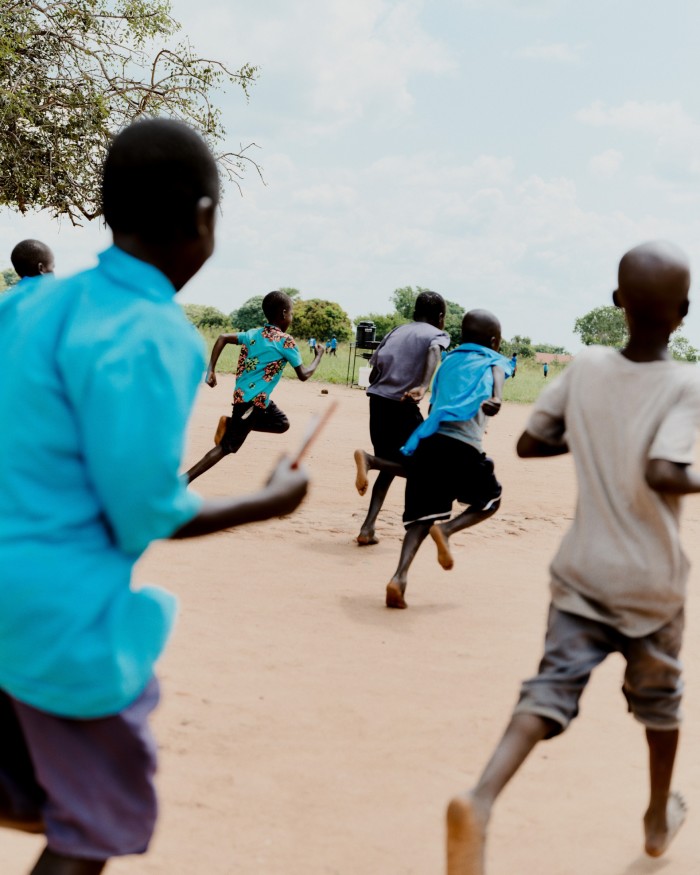
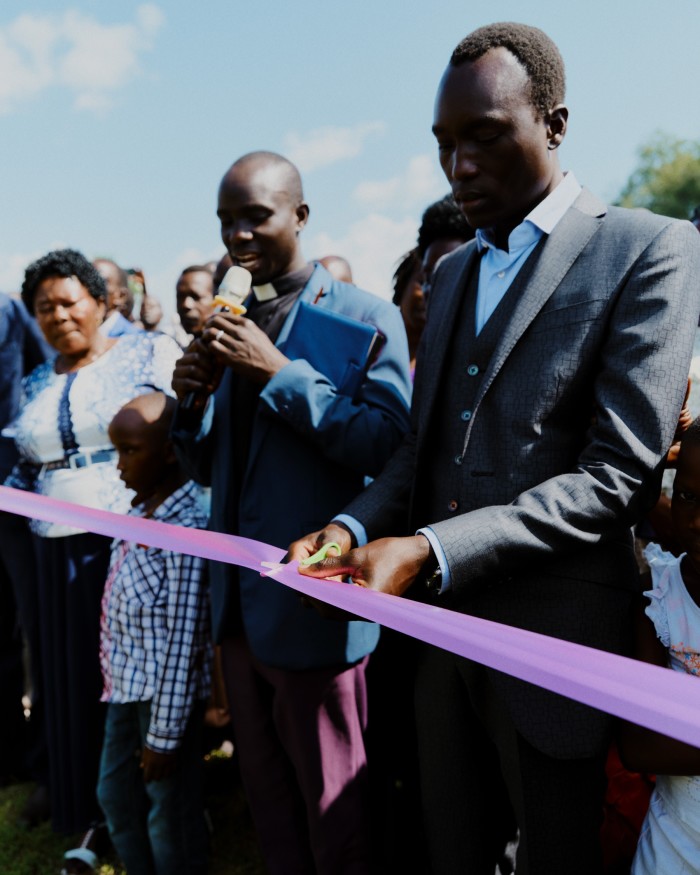
For Okwera, the answer lies in Lumule primary school. “Only through education will we see a change over there,” he says. “Had those rebel leaders been to school, they would not have started the war.” First he sent the books, pens and school supplies; now he’s tackling grades and attendance. Around 700 pupils from the area’s 17 villages – Lumule included – have signed up for class so far. School also affords the young wives and children of former soldiers a safe environment. “It’s so unfair that these children are paying the price for what their parents went through,” says Okwera.
Prudence Atukwatse, executive director of AFFCAD Uganda, a youth-focused charity based in Kampala, agrees that education could be key to Uganda’s recovery. “Education is empowering,” she says. “Girls who are in school have a low risk of teenage pregnancy and will produce fewer children – they will have manageable families but can also fight better for their rights. Skilling youths is a prerequisite for shifting power.”
Attendance is lowest among female pupils. Many stay at home when they are menstruating. Others have children of their own to attend to (the average age of a first-time mother in Uganda is around 19). Alongside the school, Okwera has opened a health hub, offering sexual-health advice, support for young mothers and a flow of formula and sanitary products. The hub will also serve as a home for Okwera’s aunt Joyce. “She’s been battling HIV for a number of years now,” he says. “But she’s doing all right.” Joyce was crucial in helping many of Lumule’s children – Okwera and his brother included – to escape the war. She now wards the hub at night.
The biggest project to date is the school’s new kitchen, which opened with a village party in June. The trip was Okwera’s second visit to Uganda since launching the foundation. His first was in August 2022, more than 20 years after leaving. Landing in Entebbe International Airport – a strip of tarmac amid the tropical lakes and emerald forest – he felt the first waves of a surreal homecoming. “It was weird,” he says. “I’m still trying to soak it all in.” In Lumule he was reunited with Joyce and, soon after, his mother. Says Okwera: “She [felt] like [she’d] missed out on my entire life.”
Without the new kitchen, most of the children wouldn’t be able to eat until dinner time. “Afternoons are a struggle in the schools because the children are starving,” says Okwera, who hopes Lumule will serve as a blueprint for other schools. The foundation has provided four chefs, a cupboard full of supplies and 10 acres of land to grow corn, beans, vegetables and sweet potatoes. The first harvest will be ready in February, in time for the new term.
Okwera addressed his guests at a fundraising event in September – among them singer-songwriter Ellie Goulding, rapper Tinie Tempah and television presenter AJ Odudu – wearing a smart Wales Bonner suit. The foundation, he said, is about sharing his “small wins” and his “big wins”. After leaving Uganda, Okwera spent many months living in temporary accommodation. Now he’s settled, he wants others like him to experience “what freedom feels like”.
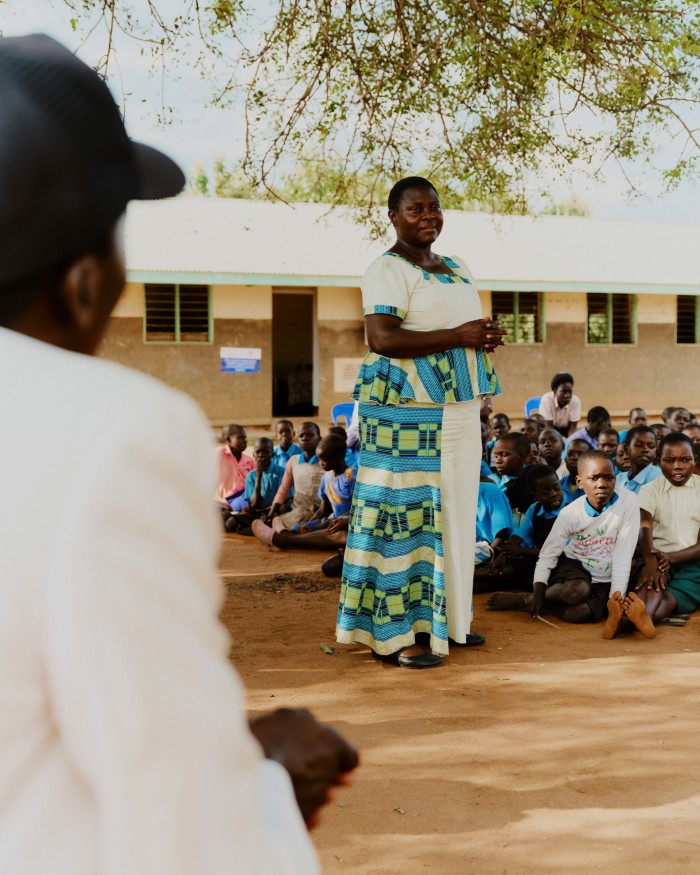
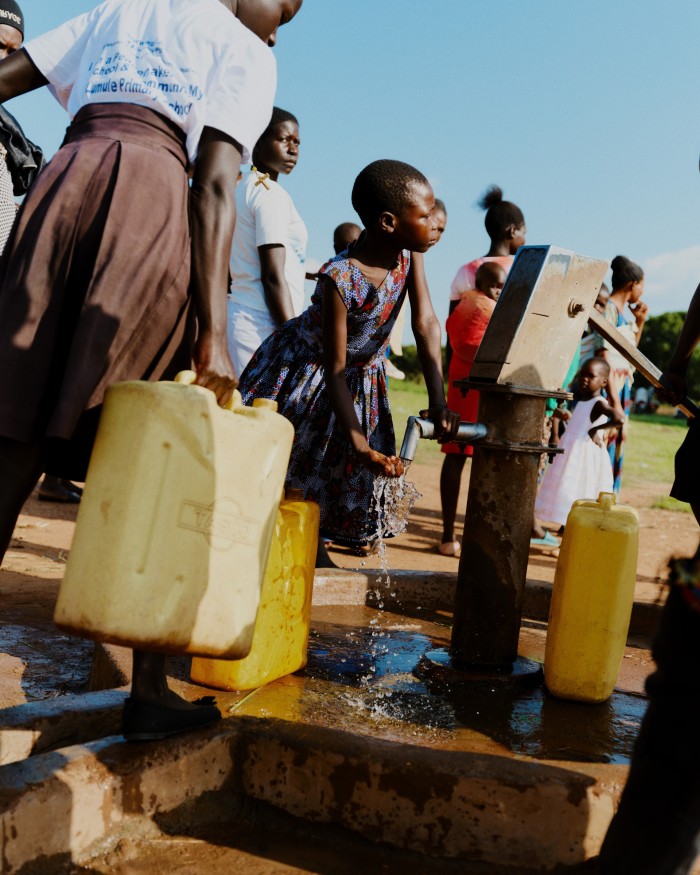
The foundation has been growing sporadically since its inauguration, with projects stopping and starting according to Okwera’s bank account. He runs through a checklist of things he needs to work on: one minute he’s on plumbing; the next he’s outlining plans to buy the village a communal motorbike. All of his updates are delivered with the same gentle tone and extravagant optimism. “He is not very organised,” says jewellery designer Houda Ghazal, Okwera’s close friend and director of the foundation. But he is “very reliable”. No matter how fanciful a goal sounds, Okwera seems to get it moving. When we first spoke in February, he had raised £6,000 of donations from a GoFundMe page. Eight months later, he’d raised more than £36,000.
Ghazal has helped set up an official donation system, overhauled the foundation’s website and is now working with Okwera on a number of fundraising opportunities. A group of trustees has been established, among them architect and textile designer Foday Dumbuya. Running a charity in Uganda, Ghazal has discovered, is no simple undertaking. The extent of the country’s impoverishment – 47 per cent of Ugandan households live in multidimensional poverty – means that many charities are vulnerable to corruption. The lack of basic amenities, meanwhile, is overwhelming. When the village pump breaks – on Okwera’s last visit it did so three times – Lumule can be without a clean source of water for up to two days. Children are especially vulnerable to diseases such as cholera, which remains a persistent deadly threat.
“Not even the government is in the position to provide adequate social services,” adds Atukwatse. “The vicious cycle of poverty is like wildfire in late summer.” She stresses the need for a new charity to “build trust and create community ownership”; projects are at risk of becoming political, and expectations are high from a “community that is still struggling to recover from a long period of armed conflict”.
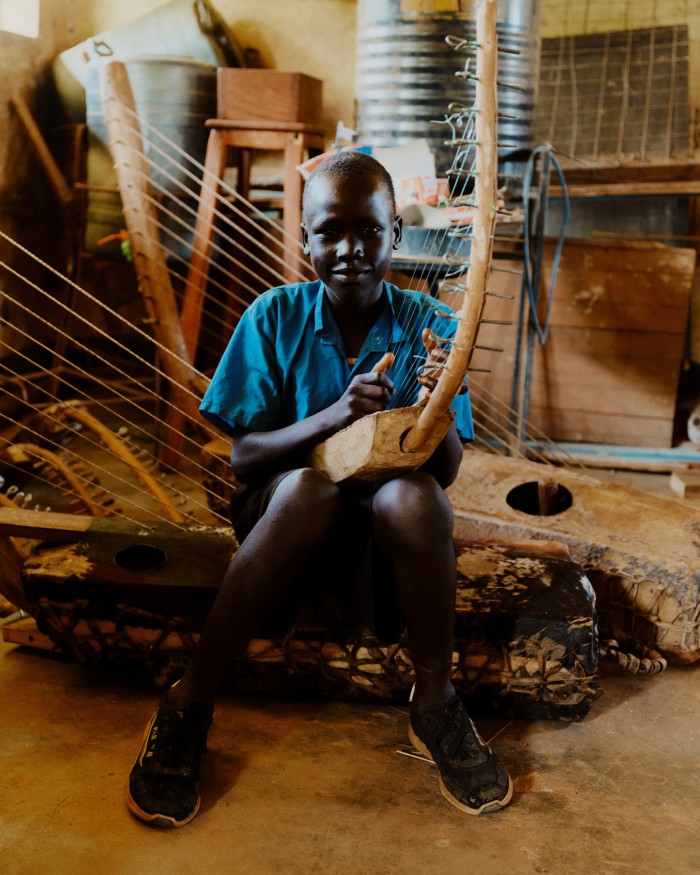
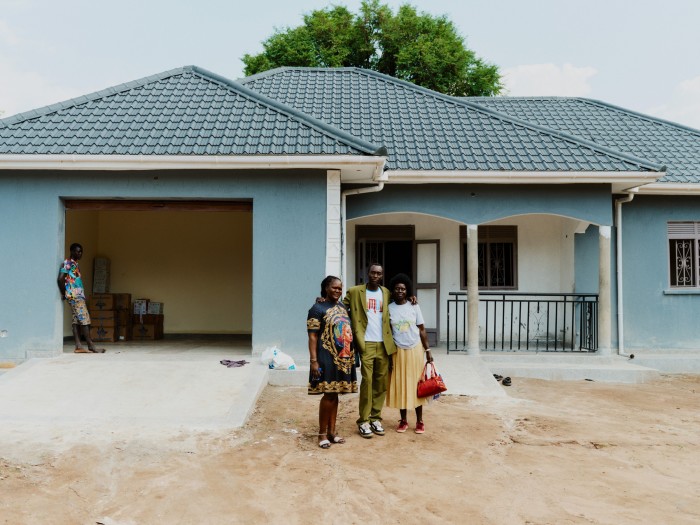
Okwera can’t save Lumule alone. Currently he aims to average three trips a year to the village. He’s directly involved in rebuilding efforts. Joyce, one of his uncles, a cousin and seven community volunteers are there to help with deliveries and admin, but the bulk of the labour requires outsourcing. A solar-powered system to fix the faulty pump has been quoted at £12,400; a dining hall to accompany the new kitchen comes in at £31,000. Okwera has also had to hire a security team to safeguard the school. “I’m broke most of the time, to be honest with you,” he says.
Slowly, however, the foundation’s network is expanding. Photographer Campbell Addy met Okwera “many moons ago”; he was the first model to be shot for Addy’s publication Niijournal. “He made me realise how beautiful the fashion industry can be,” says Addy. Hunza G co-founder Georgiana Huddart is equally “moved” by Okwera’s work, while artist Philip Colbert was “more than happy” to donate. “There could be the potential for us to collaborate on an artistic level in the future,” adds Colbert, who has recently revealed a contemporisation of Michelangelo’s incomplete masterpiece, Manchester Madonna. All three creatives were guests at Okwera’s recent fundraising dinner, an event that raised more than £5,000.
Now that the foundation is operating in an official capacity, real changes are taking place. Nobody misses school any more – the free meals alone are incentive enough – and predicted grades have shot up dramatically. This year, 41 of around 120 students will go on to secondary school. For them, this brings new challenges: the closest school is seven miles away and requires alternate accommodation. Part of Okwera’s eventual goal is to make this next step possible for all those who want it. “Next year’s primary [school] leavers will be a massive number,” he says.
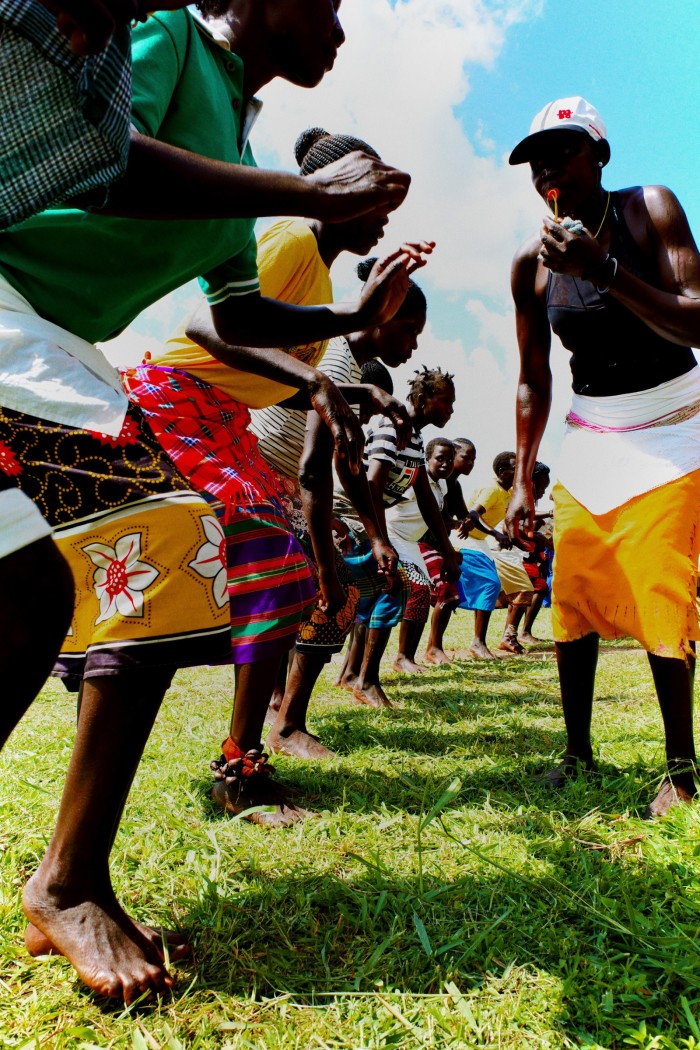


In addition, more teachers have moved to Lumule, while former villagers have returned for the first time since the war. In buying the 10-acre vegetable plot, Okwera has created a project that everyone in the village can contribute to. “It’s about empowering these kids’ parents also,” he says. “This is their thing. They own it.” For every decision made, a representative from each of the area’s 17 villages is present: “Everyone is really involved.”
There’s also something in place for young mothers for whom school is no longer an option. After Okwera sourced 12 sewing machines and a collection of mannequin heads, a 20-person entrepreneurship programme was launched. Applicants choose from three pathways – sewing, hairdressing or beauty – and receive a grant of one million UGS (around £200) to kickstart their careers. Okwera plans to expand the programme to accommodate even more students; the cost of doing so is around £8,000.


Okwera’s “ultimate dream” is to build a community centre for the young men who were kidnapped. Set for 2024, the space will offer counselling and a chance to learn new skills. Outside will be a football ground – the first sports space the village has had. “Anyone who wants help can come,” says Okwera. “It doesn’t matter whether they’re from northern Uganda or from the west.”
But these dreams are on hold until he finishes his other projects. Okwera’s vision is unwieldy, ambitious and often overwhelming. “It’s a hard job – I don’t know what I’m doing,” he admits. Nevertheless, he remains determined and optimistic. “All I know is that I want to change this community’s life.”


Comments